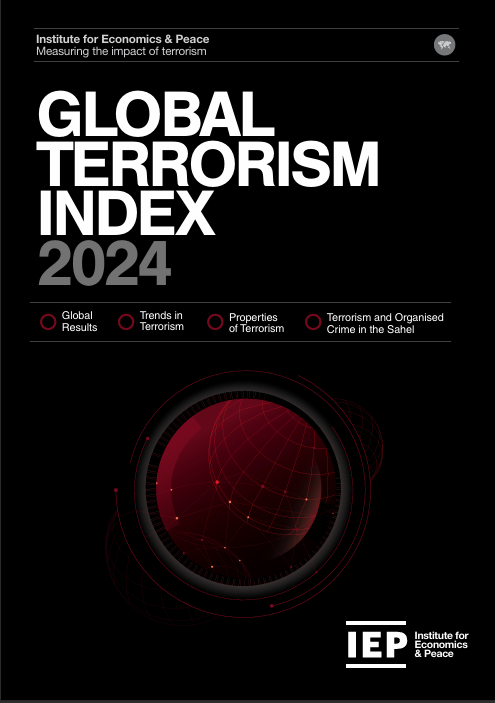Although terrorist incidents decreased in 2024, regrettably, fatalities rose by 22%, the highest since 2017. Despite less activity in the West, parts of Africa and the Middle East were still turbulent. In addition, the report highlighted potential conflicts caused by the melting Arctic sea ice. It emphasises the evolution of terrorism, pointing out that while there were fewer incidents, they were nonetheless more lethal.
This observation underscores a changing geographical threat landscape. It strongly advocates for security measures and efforts to address social and economic grievances that can spark extremism. Furthermore, Central Sahel, especially Burkina Faso, surpassed the Middle East as the main terrorism hub. Ten countries, primarily war-stricken, accounted for a staggering 87% of all terrorism deaths. Notably, Iraq exited the top ten most impacted.
Key findings
- Deaths from terrorism increased by 22% in 2023, reaching 8,352 deaths, the highest level since 2017, but still 23% lower than the peak in 2015.
- The number of terrorist attacks decreased to 3,350 in 2023, a 23% reduction from the previous year.
- Afghanistan saw a significant improvement in 2023, with terrorism deaths falling by 81%, marking the first year since 2019 that Afghanistan was not the country most impacted by terrorism.
- The average number of deaths per terrorist attack increased to 2.5 in 2023, compared to 1.6 in 2022, indicating that attacks became more deadly.
- Despite the decrease in the total number of attacks, there was a surge in highly lethal terrorist attacks in many countries in 2023, highlighting the potential for significant impact even as overall terrorist activity declined.
- Terrorism kills fewer people compared to other forms of violence like armed conflict and homicide. Still, its unique psychological and social impact can be substantial, as seen in the aftermath of specific attacks.
Overview
1 – Results
These findings highlight the changing global terrorism dynamics and the importance of vigilance and initiatives to lessen its impact. In 2023, deaths from terrorism decreased in 41 countries, showing enhanced counterterrorism efforts, and Western terrorist incidents were the lowest since 2007. However, the shift to sub-Saharan Africa, especially the Sahel, emphasizes the need for ongoing vigilance and adaptive strategies.
Offers a thorough summary of global terrorism, including analyses of affected countries and terrorist groups. It emphasizes shifts in location, attack methods, emerging threats, and links to other forms of violence. These insights are crucial for creating targeted counterterrorism strategies and improving global security.
- Deaths from terrorism rose by 22% in 2023, reaching 8,352 deaths, marking the highest level since 2017.
- The number of terrorist attacks decreased to 3,350 in 2023, showing a 23% reduction from the previous year.
- Afghanistan experienced a significant improvement in 2023, with terrorism deaths falling by 81%, marking the first year since 2019 that Afghanistan was not the country most impacted by terrorism.
- The average number of deaths per terrorist attack increased to 2.5 in 2023, compared to 1.6 in 2022, indicating that attacks became more deadly.
2 – Trends in Terrorism
These trends underscore the evolving nature of terrorism globally. This includes notable shifts in geographical impact and emerging challenges in combatting terrorism effectively. In 2023, terrorism deaths declined in 41 countries, indicating possible advancements in counterterrorism. Notably, Western terrorist incidents decreased significantly, showing effective measures. Conversely, terrorism shifted from the Middle East and North Africa to sub-Saharan Africa, signaling emerging hotspots. This varied scenario underscores the need for ongoing vigilance and adaptive global strategies.
- The number of countries recording at least one death from terrorism decreased to 41 in 2023, down from 44 in 2022 and 57 in 2015.
- Terrorist incidents in the West decreased to their lowest level since 2007, with 23 attacks and 21 deaths recorded in 2023.
- In the US, a significant portion of attacks in 2023 were linked to individuals with far-right sympathies or connections.
- Over the past decade, the impact of terrorism has increased in North America and sub-Saharan Africa, with these regions experiencing higher levels of terrorism-related deaths.
- Sub-Saharan Africa, the Middle East, North Africa, and South Asia continue to have the highest number of deaths from terrorism compared to other regions, collectively accounting for nearly 94% of terrorism-related deaths in 2023.
- The epicenter of terrorism has shifted from the Middle East and North Africa to sub-Saharan Africa, particularly concentrated in the Sahel region, which now accounts for almost half of all global terrorism-related deaths.
3 – Properties of Terrorism
Crucial insights underscore the necessity for a multifaceted approach to tackling terrorism. It suggests a focus on the specific characteristics of terrorist groups and the broader context of global security as key strategies to address this complex and evolving threat effectively.
Shows that only eleven groups were responsible for 80% of terrorism-related deaths from 2007-2023, underlining the importance of targeted counterterrorism. Understanding these groups is crucial for effective strategies, highlighting the need for international collaboration for informed responses and global security enhancement.
- A Pareto Distribution analysis reveals that just eleven terrorist groups were responsible for 80% of deaths from terrorism between 2007 and 2023.
- Understanding terrorism in the context of global security is crucial for addressing its complexities and implications.
- The concentration of terrorist activities among a small number of groups underscores the importance of targeted counterterrorism efforts and intelligence gathering to disrupt their operations effectively.
- Research and analysis on the properties of terrorism, including group dynamics, motivations, and tactics, are essential for developing comprehensive strategies to prevent and respond to terrorist threats.
- Collaboration among international stakeholders, security agencies, and researchers is vital for enhancing understanding and countering the diverse properties of terrorism worldwide.
4 – Terrorism and Organised Crime in the Sahel
Provides compelling findings highlighting the intricate relationship between terrorism and organized crime in the Sahel region. Consequently, it stresses the importance of tackling both aspects to mitigate security threats and instability in this region efficiently.
Moreover, it underscores the link between terrorism and organized crime in the Sahel, emphasizing the urgent need for a coordinated approach to enhance security. Furthermore, the presence of criminal activities such as human smuggling and arms trafficking reveals the multifaceted security threats in the area. Recognizing these challenges can significantly aid policymakers in developing robust strategies to tackle both issues, thereby improving the region’s security and stability.
- There is a clear relationship between the impact of terrorism and the level of organized criminal activity in the Sahel region.
- Criminal activities such as human smuggling, arms trafficking, and the presence of established criminal networks significantly correlate with the Global Terrorism Index.
- The overall GTI score and the Organized Crime Index are significant globally, with a stronger correlation in regions like the Sahel.
- Countries with a high impact of terrorism in the Sahel region almost always have a significant organized criminal presence, indicating a close connection between terrorism and organized crime.
- The geographic distribution of terrorism and organized crime shows overlapping areas where both criminal elements operate, highlighting the need for coordinated efforts to address these interconnected challenges.




